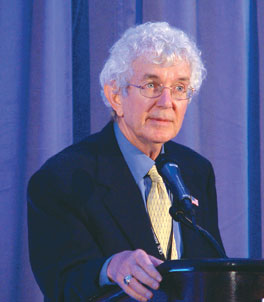Who Do We Blame for Bad Behavior?
APS-David Myers Distinguished Lecture on the
Science and Craft of Teaching Psychology

Douglas A. Bernstein delivers the APS-David Myers Distinguished Lecture on the Science and Craft of Teaching Psychology.
Classmates may not like him or her, but the teacher always appreciates the “teacher’s pet” — that one favorite student who pays attention, take notes diligently, and participates enthusiastically. Then there is the “slacker,” a teacher’s worst nightmare — the one who shows up to class a half-hour late, smacking gum loudly, cell in one hand, and music blaring loudly from an iPod. Who raised this kid?
At this year’s APS-David Myers Distinguished Lecture on the Science and Craft of Teaching Psychology, Douglas A. Bernstein, Professor of Psychology at the University of Florida, discussed the reasons behind a student’s lack of motivation, focus, and interest in school.
With over 40 years of classroom experience, Bernstein has heard every excuse from students for not completing an assignment or for showing up late to class. While he applauded these students for their imagination, creativity, and “chutzpah,” the question he found himself asking was: Who is to blame for a student’s behavior: parents or teachers?
The way a student behaves can most often be linked with the teaching style they are familiar with. According to Bernstein, teaching styles in the West today are somewhat similar and comparable to the four parenting styles described by psychologist Diana Baumrind in the 1960s. Baumrind’s four parenting styles are: authoritarian, authoritative, permissive, and neglectful. The authoritative parenting style is considered to be ideal, as it creates an atmosphere of caring, give and take, and rules that children can understand and follow. Authoritative parenting is even thought to increase a child’s intellectual ability.
Bernstein believes there is a link between parenting and teaching and that parenting styles as described by Baumrind can translate into similar teaching styles. Bernstein encourages teachers to think in terms of parenting styles when they evaluate how they teach. He challenged teachers to ponder this question in particular: Do the four teaching styles actually exist, and if they do, how does it correspond to parenting styles and affect a student’s behavior in the classroom?
In his concluding remarks, Bernstein also questioned whether a teacher’s teaching style interacted with his or her students’ characteristics and personality. Bernstein also highlighted the importance of the ideal teaching and parenting style, the authoritative style, as it teaches students and children to be responsible adults in well-established roles that will benefit society.





APS regularly opens certain online articles for discussion on our website. Effective February 2021, you must be a logged-in APS member to post comments. By posting a comment, you agree to our Community Guidelines and the display of your profile information, including your name and affiliation. Any opinions, findings, conclusions, or recommendations present in article comments are those of the writers and do not necessarily reflect the views of APS or the article’s author. For more information, please see our Community Guidelines.
Please login with your APS account to comment.